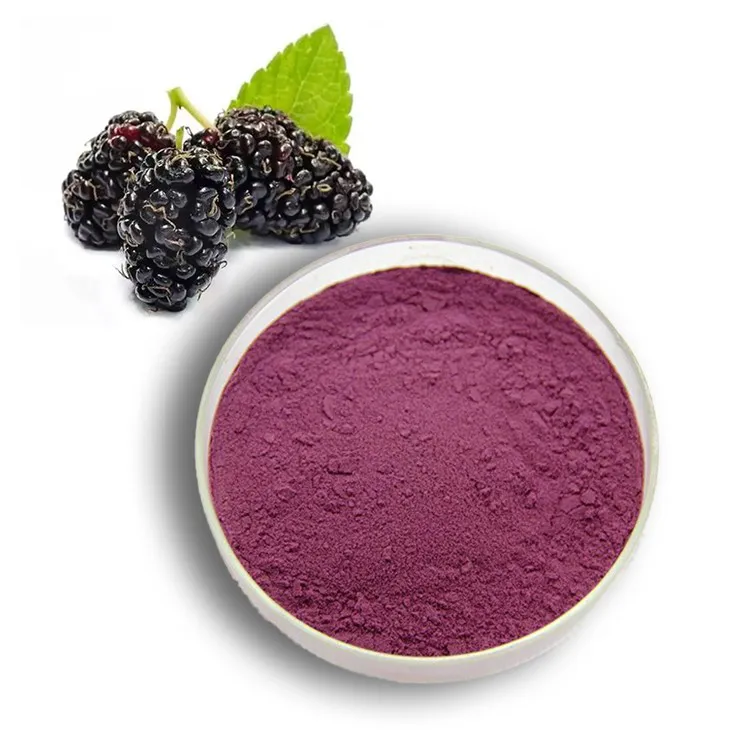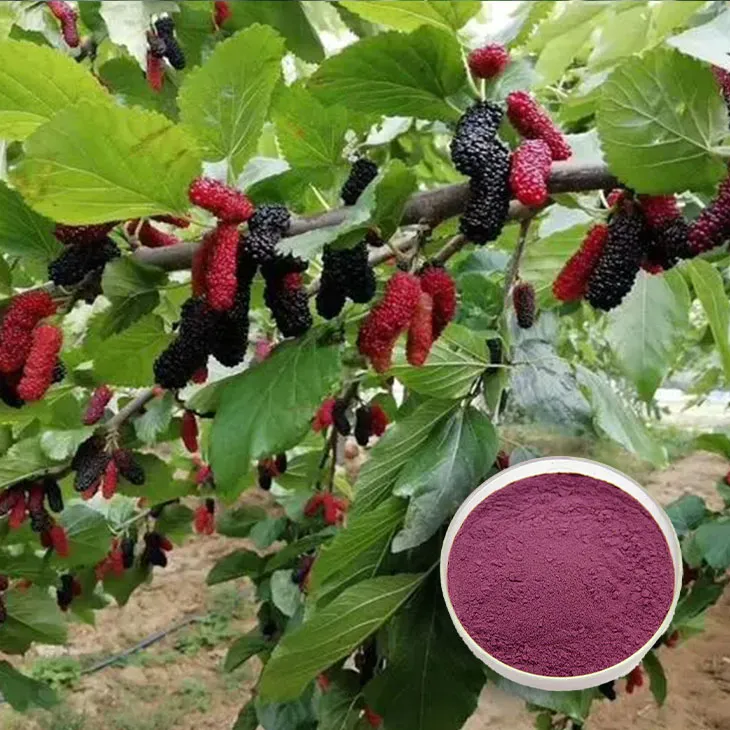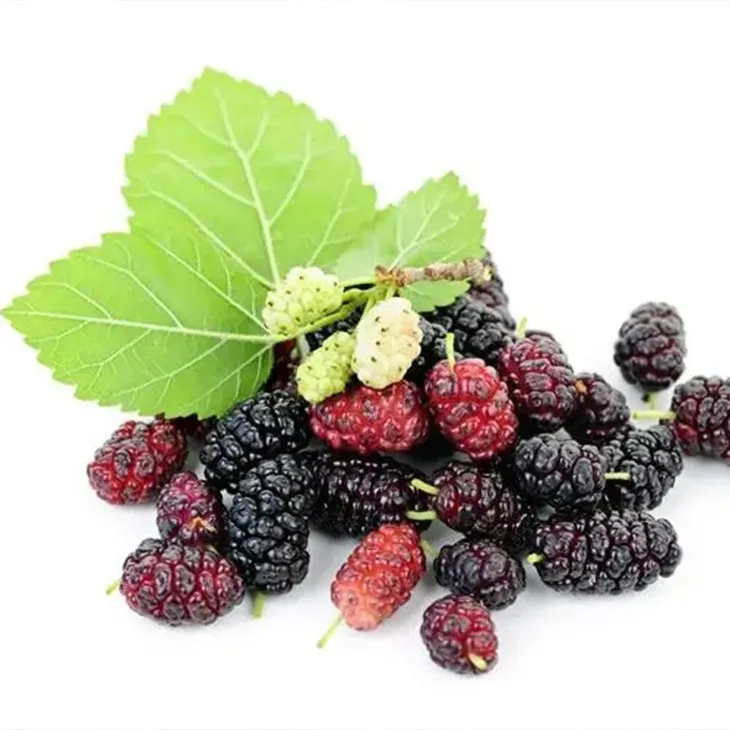- 0086-571-85302990
- sales@greenskybio.com
Mulberry Extract: Should You Use It for Skin Care?
2024-11-12

1. Introduction
Skincare has become an increasingly important aspect of our daily routines, with a plethora of products available in the market. Among the many natural ingredients being incorporated into skincare products, Mulberry Extract has emerged as a potentially beneficial component. This article aims to comprehensively explore the various aspects of Mulberry Extract in skincare, including its properties, benefits, and considerations, to help you make an informed decision about whether it should be part of your skincare regimen.

2. What is Mulberry Extract?
Mulberry extract is derived from the mulberry tree, which has been used in traditional medicine for centuries in various cultures. There are different species of mulberry trees, such as Morus alba, Morus nigra, and Morus rubra, and the extract can be obtained from different parts of the tree, including the leaves, fruits, and roots.
2.1 Chemical Composition
Mulberry extract contains a variety of bioactive compounds. One of the key components is resveratrol, which is also found in grapes and has antioxidant properties. It also contains flavonoids, such as anthocyanins, which are responsible for the deep purple color of mulberry fruits and are known for their antioxidant and anti - inflammatory effects. Additionally, there are phenolic acids in mulberry extract, which contribute to its overall health - promoting properties.

3. Properties of Mulberry Extract
3.1 Antioxidant Property
The antioxidant property of mulberry extract is one of its most significant features. Free radicals are unstable molecules that can damage cells in the skin, leading to premature aging, wrinkles, and other skin problems. Antioxidants in mulberry extract, such as resveratrol and flavonoids, can neutralize these free radicals. By donating an electron to the free radicals, they stabilize them and prevent them from causing further harm to the skin cells. This antioxidant activity helps in maintaining the overall health and youthful appearance of the skin.
3.2 Anti - Inflammatory Property
Mulberry extract also exhibits anti - inflammatory properties. Inflammation in the skin can be caused by various factors, such as environmental pollutants, allergens, and skin infections. Chronic inflammation can lead to skin conditions like acne, eczema, and psoriasis. The flavonoids and phenolic acids in mulberry extract can help reduce inflammation by inhibiting the production of inflammatory mediators in the skin. This can soothe irritated skin, reduce redness, and promote the healing of inflamed skin areas.
3.3 Whitening or Brightening Property
Another notable property of mulberry extract is its potential for skin whitening or brightening. In some traditional medicine practices, mulberry has been used to lighten skin tone. This is mainly due to the presence of certain compounds that can inhibit the activity of tyrosinase, an enzyme involved in the production of melanin. Melanin is the pigment responsible for skin color, and excessive melanin production can lead to dark spots, hyperpigmentation, and an uneven skin tone. By inhibiting tyrosinase, mulberry extract can help reduce the production of melanin, resulting in a brighter and more even - toned skin.

4. Benefits of Mulberry Extract in Skincare
4.1 Anti - Aging Benefits
As mentioned earlier, the antioxidant property of mulberry extract plays a crucial role in anti - aging. By protecting the skin from free radical damage, it helps in reducing the appearance of wrinkles, fine lines, and sagging skin. It can also stimulate collagen production in the skin. Collagen is a protein that provides structural support to the skin, and as we age, collagen production decreases. Mulberry extract can potentially boost collagen synthesis, making the skin more firm and elastic, thus giving it a more youthful look.
4.2 Treatment of Skin Conditions
- For acne - prone skin, the anti - inflammatory property of mulberry extract can help reduce redness and swelling associated with acne breakouts. It can also prevent the formation of new acne lesions by inhibiting the growth of bacteria that contribute to acne, such as Propionibacterium acnes.
- In the case of eczema and psoriasis, the anti - inflammatory and antioxidant effects of mulberry extract can soothe the itchy and inflamed skin, and may help in reducing the frequency and severity of flare - ups.
4.3 Skin Brightening and Even - Toning
Those with hyperpigmentation issues, such as dark spots caused by sun damage or hormonal changes, can benefit from mulberry extract. By inhibiting tyrosinase, it can gradually fade existing dark spots and prevent the formation of new ones, resulting in a more even - toned complexion.
5. Considerations When Using Mulberry Extract in Skincare
5.1 Allergic Reactions
Although mulberry extract is generally considered safe for most people, some individuals may be allergic to it. Allergic reactions can range from mild skin irritation, such as redness and itching, to more severe symptoms like swelling and difficulty breathing in rare cases. Before using a skincare product containing mulberry extract, it is advisable to do a patch test. Apply a small amount of the product on a small area of skin, such as the inside of the wrist, and wait for 24 - 48 hours to see if there are any adverse reactions.
5.2 Quality and Source of the Extract
The quality of mulberry extract can vary depending on the source and the extraction method. It is important to choose products that use high - quality mulberry extract. Look for products from reputable brands that disclose the source of their extract and the extraction process. Organic and sustainably sourced mulberry extract may also be a better option, as it reduces the risk of contamination with pesticides and other harmful substances.
5.3 Interaction with Other Skincare Ingredients
Mulberry extract may interact with other skincare ingredients. For example, some acidic ingredients may affect the stability of the active compounds in mulberry extract. It is important to read the labels of skincare products carefully and consult a dermatologist if you are using multiple products simultaneously to ensure that there are no potential negative interactions.
6. How to Incorporate Mulberry Extract into Your Skincare Routine
6.1 Mulberry Extract - Based Skincare Products
There are various skincare products available that contain mulberry extract. These include serums, creams, lotions, and masks.
- Serums: Mulberry extract serums are often lightweight and can be easily absorbed into the skin. They are usually applied after cleansing and toning the skin and before applying moisturizer. Serums with a high concentration of mulberry extract can deliver a potent dose of its beneficial compounds directly to the skin.
- Creams and Lotions: These are more moisturizing and can be used for daily skin hydration. Creams are generally thicker than lotions and are suitable for those with drier skin types. When choosing a cream or lotion with mulberry extract, look for products that also contain other beneficial ingredients such as hyaluronic acid for added hydration.
- Masks: Mulberry extract masks can provide an intensive treatment for the skin. They are typically left on the face for a specific period, usually 10 - 20 minutes, depending on the product. Masks can help to deeply nourish the skin, improve skin tone, and reduce the appearance of pores.
6.2 DIY Skincare with Mulberry Extract
If you prefer a more natural and hands - on approach, you can also create your own DIY skincare products using mulberry extract.
- Mulberry Extract Toner: You can make a simple toner by steeping mulberry leaves in hot water for about 10 - 15 minutes, then straining the liquid. This toner can be used after cleansing the face to balance the skin's pH and provide antioxidant benefits.
- Mulberry Extract Face Mask: Combine mashed mulberry fruits (or powdered mulberry extract) with a base such as yogurt or honey. Yogurt contains lactic acid which can exfoliate the skin gently, while honey has moisturizing and antibacterial properties. Apply the mixture to your face and leave it on for 10 - 15 minutes before rinsing off.
7. Conclusion
Mulberry extract offers a range of potential benefits for skincare, including antioxidant, anti - inflammatory, and skin - whitening properties. It can be beneficial for anti - aging, treating skin conditions, and improving skin tone. However, there are also considerations such as the possibility of allergic reactions, the quality of the extract, and its interaction with other ingredients. By being aware of these factors and choosing the right products or DIY recipes, you can decide whether mulberry extract should be incorporated into your skincare routine. Overall, mulberry extract has the potential to be a valuable addition to your skincare arsenal, but it is important to make an informed choice based on your individual skin type and needs.
FAQ:
What are the main properties of mulberry extract for skincare?
Mulberry extract is rich in antioxidants such as flavonoids. These antioxidants can help protect the skin from free radical damage, which is often caused by environmental factors like UV radiation and pollution. It also has anti - inflammatory properties, which may soothe irritated skin. Additionally, it may contain substances that can help in brightening the skin tone by inhibiting the production of melanin to some extent.
How can mulberry extract benefit the skin?
The antioxidant nature of mulberry extract helps in preventing premature aging of the skin. By fighting free radicals, it can reduce the appearance of wrinkles and fine lines. The anti - inflammatory aspect can be beneficial for those with sensitive or acne - prone skin, as it can calm redness and inflammation. For those concerned with skin pigmentation, its potential to inhibit melanin production may lead to a more even skin tone and a reduction in dark spots.
Are there any potential side effects of using mulberry extract in skincare?
While mulberry extract is generally considered safe for most people, some individuals may be allergic to it. Skin irritation or allergic reactions such as redness, itching, or swelling can occur in sensitive individuals. It is always advisable to do a patch test on a small area of skin before using any product containing mulberry extract on a larger area.
How should products with mulberry extract be used in a skincare routine?
If using a product with mulberry extract, such as a serum or moisturizer, it should be applied as per the general guidelines for that type of product. For example, serums are usually applied after cleansing and toning, and before moisturizing. However, it is important to follow the specific instructions provided on the product packaging. Start with a small amount and gradually increase if no adverse reactions are observed.
Can mulberry extract replace other common skincare ingredients?
Mulberry extract has its own unique set of properties, but it cannot completely replace other common skincare ingredients. For example, sunscreen is essential for protecting the skin from UV rays and cannot be substituted by mulberry extract alone. However, it can be a valuable addition to a skincare routine that already includes other beneficial ingredients like hyaluronic acid for hydration or retinoids for anti - aging.
Related literature
- The Role of Mulberry Extract in Cosmetics: A Review"
- "Mulberry Extract and Skin Health: Current Research Findings"
- "Beneficial Effects of Mulberry - Derived Compounds in Skincare"
- ▶ Hesperidin
- ▶ Citrus Bioflavonoids
- ▶ Plant Extract
- ▶ lycopene
- ▶ Diosmin
- ▶ Grape seed extract
- ▶ Sea buckthorn Juice Powder
- ▶ Fruit Juice Powder
- ▶ Hops Extract
- ▶ Artichoke Extract
- ▶ Mushroom extract
- ▶ Astaxanthin
- ▶ Green Tea Extract
- ▶ Curcumin
- ▶ Horse Chestnut Extract
- ▶ Other Product
- ▶ Boswellia Serrata Extract
- ▶ Resveratrol
- ▶ Marigold Extract
- ▶ Grape Leaf Extract
- ▶ New Product
- ▶ Aminolevulinic acid
- ▶ Cranberry Extract
- ▶ Red Yeast Rice
- ▶ Red Wine Extract
-
Grape Leaf Extract
2024-11-12
-
Stevia Extract
2024-11-12
-
Hawthorn Extract
2024-11-12
-
Beetroot juice Powder
2024-11-12
-
Cat Claw Extract
2024-11-12
-
Jujube Extract
2024-11-12
-
Mulberry leaf Extract
2024-11-12
-
Lotus leaf extract
2024-11-12
-
Cranberry Extract
2024-11-12
-
Epimedium extract powder
2024-11-12





















